Do Guns Make Us Free? by Firmin DeBrabander

Author:Firmin DeBrabander [DeBrabander, Firmin]
Language: eng
Format: epub
ISBN: 9780300213652
Publisher: Yale University Press
Published: 0101-01-01T00:00:00+00:00
CHAPTER FOUR
Guns and the Threat to Democracy
HE dispersion of physical power in society is both a cause and an affirmation of dispersion of political power.”1 So says gun rights proponent and Cato Institute fellow David Kopel. Guns are essential to democracy, in his view: they give real power to the people. We cannot retain popular sovereignty without privately owned guns, generously dispersed. Guns back up the vote, if you will—they ensure that we are heard, our will heeded, and our sovereignty preserved.
Democracy, gun rights advocates like to remind us, is founded on a violent moment. Power must be ripped from the hands of elites, who do not share it willingly or happily. It must be taken forcibly, through revolution. Gun rights advocates, clearly mindful of Americans’ own revolutionary moment, verily worship the Founding Fathers and claim to pose a similar revolutionary threat against standing government today. As they have it, the revolution is ongoing: those whom we elect must be chastened, their ambitions contained. Guns bolster the people’s democratic confidence and are a reminder of our revolutionary power, and destiny.
Further, Kopel declares, guns distinguish the particularly American brand of democracy, the most enduring of modern democracies and the inspiration and advocate for emerging democracies around the world. The archetypal heroes of various nations, he argues, are highly indicative:
The armed Canadian hero is a government employee (the mounted policeman); the armed Japanese hero is an aristocrat (the samurai). Unlike the British knight (with expensive armor), the Japanese samurai (with handcrafted, exquisite sword), or the Canadian mounted policeman (carrying a government-issued handgun that ordinary persons were not allowed to carry), the classic armed American hero—the cowboy—sported a mass-produced Colt .45 that could be bought at a hardware store. The cowboy’s Colt revolver was known as the great equalizer … because firearms make a smaller, less powerful person functionally equal to a larger person.2
That is to say, guns underscore the fundamental equality of American democracy. They ensure that citizens remain equal, and equal to those who hold power. They ensure that the people remain vigilant, mindful citizens, unlike citizens of other so-called democracies, who naively assign control to a new aristocracy of bureaucratic elites. Kopel suggests we shouldn’t expect any better from Europe or Japan, steeped as they are in feudal traditions. Only the American experience is democratic through and through. Americans had to be self-reliant from the start, out on the frontier protecting themselves and upholding justice, and guns are central to that experience. Thanks to our gun culture, we on these shores are more resilient democrats, less inclined to slip into submissiveness. The gun debate is thus the central struggle of democracy. “What is ultimately at stake” in the fight over gun control, Kopel argues, “is the same question that precipitated the American Revolution: whether the American people are the sovereigns in their own country or whether they should be ruled from above, for their own good, according to the supposedly benevolent commands of the elitist rulers of a top-down, European-style society.
Download
This site does not store any files on its server. We only index and link to content provided by other sites. Please contact the content providers to delete copyright contents if any and email us, we'll remove relevant links or contents immediately.
| Civil Rights | Discrimination |
| General | Human Rights |
Day by Elie Wiesel(2777)
The Age of Genius by A. C. Grayling(2571)
Gideon's Spies: The Secret History of the Mossad by Gordon Thomas(2331)
The Gulag Archipelago (Vintage Classics) by Aleksandr Solzhenitsyn(2078)
FATWA: Hunted in America by Pamela Geller(1994)
Columbine by Dave Cullen(1862)
Men Explain Things to Me by Rebecca Solnit(1718)
The Rule of Law by Bingham Tom(1679)
Anatomy of Injustice by Raymond Bonner(1654)
Examples & Explanations: Administrative Law by William F. Funk & Richard H. Seamon(1631)
Three Cups of Tea by Greg Mortenson(1606)
The Source by James A. Michener(1601)
That Every Man Be Armed by Stephen P. Halbrook(1575)
ADHD on Trial by Michael Gordon(1568)
Future Design by Unknown(1562)
Gideon's Spies by Gordon Thomas(1497)
Palestinian Walks by Raja Shehadeh(1494)
Constitutional Theory by Carl Schmitt(1447)
Nothing to Envy by Barbara Demick(1440)
